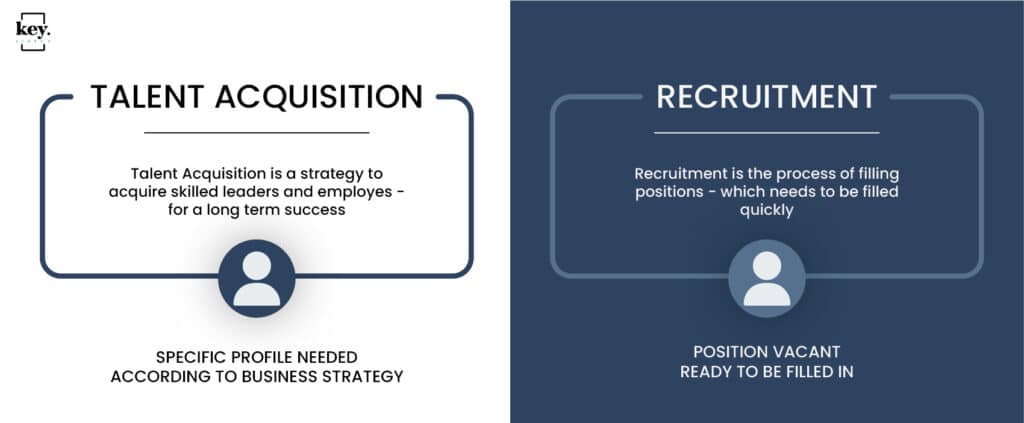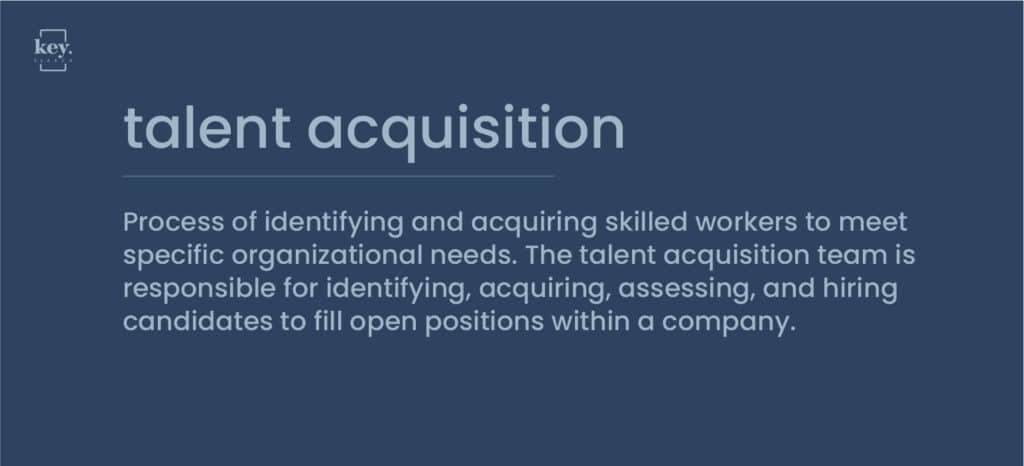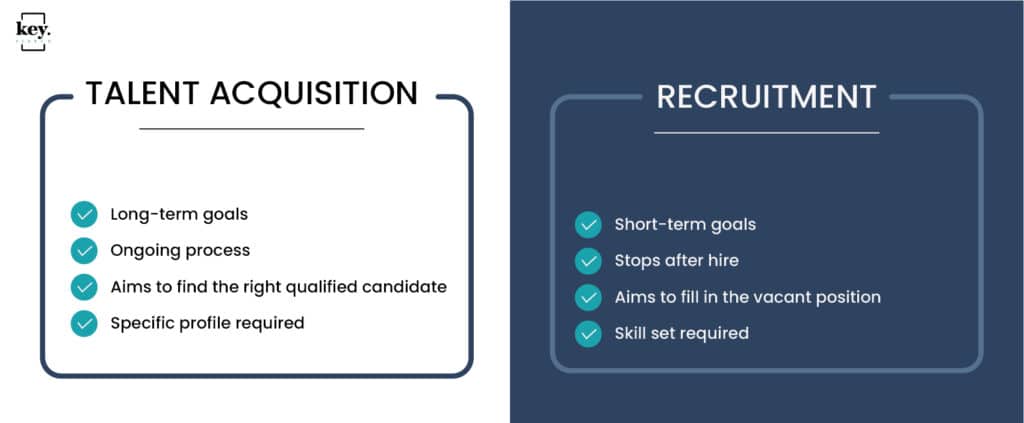It goes without saying that when it comes to your employees, you want to attract the cream of the crop. The question is, do you want them to grow with the company, or come to the table with a specific skill set already in place?
Fortunately, the two don’t have to be mutually exclusive. Let’s take a look at talent acquisition vs recruitment to determine which course is wisest—and whether this might change in certain situations.
Contents

How Does Talent Acquisition Work?
- A personable approach
- A tenacious attitude
- In-depth knowledge of the company’s needs
- A background in sales or a related field

Talent Acquisition Meaning
Now that we’ve covered the basics, let’s get into the specific definition of talent acquisition and how it could benefit your business.
As we mentioned, this involves seeking out the individual who will be the best fit for the job. The people responsible for fulfilling these tasks might go by a variety of names: hiring manager, hiring specialist, HR manager, talent acquisition manager, talent acquisition HR director, managing consultant, sourcer, or recruiting agent. However, recruiting and talent acquisition aren’t exactly the same thing, which is what we’re here to discuss.

Great workers don’t just fall out of trees. It’s the responsibility of the talent acquisition team to find and attract desirable candidates, and to take whatever steps are necessary to get them on board.
While this strategy is invaluable in the corporate world, it’s a good approach for any business to take, even the smaller ones. Why? Because when it comes to finding top talent, the competition is fierce. Recent surveys have shown that nearly one-third of workers plan on leaving their current job within the year. It’s up to you to ensure that your employees feel satisfied and enriched in their work.
So, as a member of a talent acquisition team, what would your role be?
First and foremost, you would need to study the market to get a good feel for supply and demand. Once you understand the symbiotic nature of these two elements, you’ll be able to apply them to your own company in ways that will benefit the workers as well as the bottom line.
On a related note, pay close attention to the way your company is perceived by the general public. If you have a solid reputation, you’re bound to attract more qualified workers. It’s also a good idea to familiarize yourself with your closest competitors, so you know what you’re up against.
Once you’re confident in your understanding of your company, its goals, and its standing in the market, it’s time to map out what you hope to accomplish as a result of your talent acquisition strategy. Which areas need the most work? What qualities would your ideal candidate have, and how would these qualities help you to meet your goals?
Remember—you’re not just trying to get people in the door. You’re trying to convince the most qualified candidates that they’ll be a great fit for your company in the long run.
Recruitment Defined
When you recruit candidates, you’re attempting to fill vacant positions. The process consists of finding available workers, interviewing them for the job (or jobs), and potentially offering employment. While some people think that a recruiter’s job is done as soon as the candidate lands an interview, the recruitment process actually lasts right up until the new hire is successfully integrated into the workplace.

Recruiting begins with a basic outline of the position, often accompanied by a profile listing all the preferred qualities of the ideal candidate. Recruitment software is typically used in the screening process. When the right candidate is found, they’re offered a position; if they take it, their transition into the workplace begins.
Most companies place a great deal of value on recruitment. It comes in handy for large corporations that have a lot of positions to fill. Recruiters should know exactly what these positions entail, so that they can answer questions honestly and comprehensively. It also helps if they familiarize themselves with the different software brands, so they can make the process easier on themselves and avoid wasting the applicants’ time.
Talent Acquisition vs Recruitment: How They Differ
Recruitment and talent acquisition have one goal in common: To attract more qualified workers to the company. How, then, do they differ?
While recruitment focuses mainly on short term goals—filling as many positions as possible—talent acquisition broadens the scope. Instead of merely checking off boxes, the strategy considers the far-reaching consequences of each hire. It keeps the company’s long-term goals in mind, while never losing sight of the fact that the workers are largely responsible for the achievement of those goals.
There’s one other subtle difference. A candidate’s recruitment is considered to be complete once the new hire is brought on board. Talent acquisition, on the other hand, is considered an ongoing process. Long after the hiring process is complete, the talent acquisition team is tracking the candidates’ progress, with an eye toward guiding them into upper-level positions.
To put it in practical terms, imagine that you have several candidates all jockeying to fill a certain position. Two of them are qualified on paper—they have the basic education and experience that’s listed in the job description.
A third one is highly qualified, with as much experience as the first two put together. She currently works for a competing agency that commands a great deal of respect within the industry. The catch? She’s asking for more money than the company was prepared to offer.
There’s a fourth candidate who’s a recent college graduate. He has promising ideas and a great attitude, but not enough experience to back him up.
The hiring manager will probably be attracted to the third candidate, because she has so much to offer. Still, she works for a competitor who’s likely willing to pour a lot of resources into keeping her on board. Trying to lure her away would likely result in a bidding war, and that’s not in the company’s best interests.
Bringing in a fresh new talent, on the other hand, is in the company’s best interests. That’s why the hiring manager might lean toward the recent college grad instead. By keeping the hire within the company’s budget, he’ll be contributing to the bottom line in the short term. By hiring a promising candidate who’s willing and able to grow with the company, he’ll be investing in the future of the business.
Should You Focus More on Talent Acquisition or Recruitment?
Which one of these strategies would benefit you most? Obviously, it depends on whether you need to fill positions immediately, or if you have the time to cultivate a more specific employee profile. In many cases, it’s possible to focus on both, but you might want to prioritize one over the other.
If your business involves manufacturing, you may want to focus more on talent acquisition. That’s because the rise of “green” technology is reshaping the industry, leading to a higher demand for workers with non-traditional skill sets. Candidates with backgrounds in computer science or environmental studies will stand out from the crowd, and other companies will be vying for their favor. If you have a dynamic talent acquisition team, you’ll be able to stay one step ahead of the competition.
Tech start-ups would also do well to take the long-term approach. Technology advances at such a fast pace, meaning these businesses risk falling behind if they don’t have a good talent acquisition strategy in place.
In fact, acquisition will benefit any business that’s attempting to put down roots. Having fresh talent on hand will allow you to grow along with the industry. What’s more, when the employees have been with the company since its inception, they’ll be more capable of anticipating your needs.
Even if your business is well-established, it may be better to forego simple recruitment in favor of acquisition. The approach will show candidates that you’re willing to invest in their careers, which will encourage them to work harder as a result. This is true for corporations and mom-and-pop enterprises alike.
There’s nothing inherently wrong with recruitment, but it may suffer from the comparison to acquisition. If you find yourself scrambling to fill a lot of positions, you might end up hiring people too quickly. This can lead to a high turnover rate, which causes morale to drop among the existing employees.
Takeaways
So, when should you recruit and when should you acquire? The answers may vary based on current trends, the needs of the agency, and the level of talent required. However, there are a few basic guidelines to be aware of.

As a general rule, you should recruit when you have vacant positions that need to be filled as soon as possible. In these cases, you know exactly what the job requires, enabling you to build a reliable profile for the ideal candidate.
There are two major questions you should return to when recruiting. The first is, “Is this candidate capable of fulfilling the tasks required for this position?” The second is, “Which one of these candidates would be able to fulfill these tasks with the greatest efficiency?”
On the other hand, you should acquire when you’re looking for a position that requires a specific skill set. Employers who operate in niche markets, such as software development, are more likely to focus on talent acquisition.
Newer businesses will benefit from this approach as well. Since most candidates have never heard of your company, it can be difficult to attract top talent. In these cases, the acquisition strategy should put a strong focus on marketing in order to build the company brand. This is especially true if you’re starting small but hoping to compete in the global market.
Additionally, acquisition is the preferred approach if you’re building a position from the ground up. Unlike job vacancies, which give you an established framework, new positions can be a mystery even to the business owners. In these cases, you’re better off hiring the best talent and allowing them to tailor the position according to their skill set.
The bottom line? For short-term goals, like filling a spot that’s recently been vacated by another qualified employee, recruitment is your best option. If your goal is to invest in a candidate and groom them for a long-term career with your company, then talent acquisition is the right approach.
Using Talent For C-Level Positions
What if you already know you need to hire a high-level executive? When it comes to hiring industry leaders, recruitment may not work, because the competition for the ideal candidate will be too fierce. And since these individuals already have years of experience in a specific field, acquisition won’t be the answer either.
That’s when you should turn to the executive search option. Also known as headhunting, this service allows you to seek out the most qualified candidates through a third-party organization.
The executive search agency will research candidates based on your criteria and contact any who look like they fit the bill. If the candidate is working for another company, the agency will discreetly reach out to determine if they’re willing to relocate. You may have to pay for the privilege, but you should be rewarded with the best person for the job.
You can use these services to recruit any top-level professional, from presidents to CEOs. Some niche markets may even require the executive search option for lower-level positions, as there are so few candidates available.

